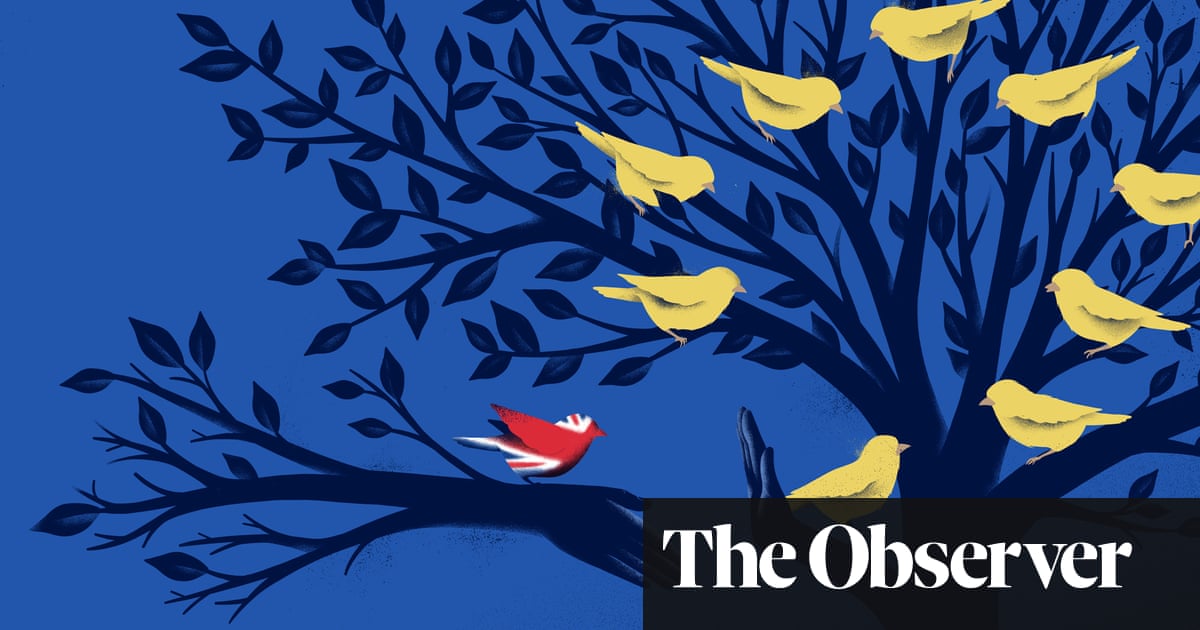
Two years ago, I was in the Middle East when the British referendum on membership of the EU took place. I cast my proxy vote in favor of staying in the EU — I was and still am a “Remainer.” I went to bed thinking the country was staying in and woke to find we had voted to leave. The pollsters were almost all wrong. David Cameron’s gamble — that a referendum would enable him to remove the threat the UK Independence Party posed to the Conservative Party — had spectacularly backfired.
And, when I went on to my Facebook feed, I encountered a wave of fury and outrage: It turned out I didn’t know a single “Brexiteer” or, if I did, they were keeping very quiet. And yet I had grown up in many of the places that had swung the vote — parts of the post-industrial cities of Birmingham and Nottingham or the rural Midlands. And I had known well the left-behind seaside towns where the political tide had now roared back in with a vengeance.
I have tried since then not to comment on what happened and on the messy process that has followed. It’s difficult. We still don’t know what the final deal with the EU will really be. And, most of all, there are simply too many people out there already shouting at each other like CDs stuck on the same track at maximum volume in a machine you can’t switch off. Why add to the noise? But I’ve decided to write this one thing and then shut up until it’s all over. So here goes.
The first thing to say is that this result should really not have been such a surprise. As the National Centre for Social Research recently pointed out, levels of British support for leaving the EU or reducing its power have been close to or above 50 percent for more than 20 years. So, whatever this vote was, it wasn’t an aberration. It wasn’t about white racism either. If it had been, Remain would have won massively. Instead, as a distinguished British academic has recently pointed out, “large numbers of affluent conservatives, one in three of Britain’s black and ethnic minority voters, almost half of 25 to 49 year olds, one in two women and 40 percent of voters in the Greater London area” all voted to leave. You wouldn’t know this from listening to most media commentary.
The second thing is that it wasn’t just about immigration. This was undoubtedly a big issue, brought into extraordinary focus by the migration crisis in the Mediterranean and the deeply flawed EU response to it. But so was the sense that the European project as a whole was profoundly undemocratic and benefited those my colleague in Policy Exchange, David Goodhart, has called the “Anywheres,” rather than the “Somewheres” — that is those, often with extensive higher education and professional success, who feel the world is their oyster, rather than those who feel a powerful attachment to a particular place, nation and culture and believe them to be under threat of change without their consent.
The third thing is that the evidence also suggests those who voted to leave had formed their views long before the referendum was even called, and they were not deceived by fake news (even though both sides were guilty of making things up during the campaign).
The frustrating thing is that so many can’t seem to move beyond the visceral feelings of contempt, anger and resentment that the referendum aroused and have a proper national debate about what the result really means — in terms of opportunities as well as the reverse. And that for me is the critical issue.
Brexit may have revealed many grievances in UK society, but our shared political culture is perhaps the most important national asset we have. It should be strengthened and preserved.
Sir John Jenkins
The UK is the sixth biggest economy in the world. It is one of Europe’s two nuclear and also serious non-nuclear military powers. It is a world leader in financial services, cybersecurity, higher education and life sciences. It is one of the five Permanent Members of the UN Security Council. In spite of the referendum, it has one of the most stable political systems in the world. It has enormous cultural influence. And, through its historic links with most parts of the world and the massive investments it makes overseas, it has truly global interests.
I think leaving the EU was the wrong decision: Given the state of the world and the rise of insurgent populisms elsewhere (Brexit is not the only example by any means), this is a time to stick together, not split. And there really is such a thing as a common European heritage and shared interests. In addition, there will undoubtedly be significant economic costs for the UK. But there will also be costs for the EU. Some may think — in the mercantilist tradition of Jean-Baptiste Colbert and others — that this is an opportunity to take business away from the UK. I don’t think this will be nearly as easy to do as they might believe. And, if they try, then the British government post-Brexit will feel pressure to respond. That is not a recipe for happy future relationships.
So we need a deal that works for everyone. Will we get one? I simply don’t know. No doubt the EU itself institutionally feels the centrifugal pressures building in Hungary, the Czech Republic and Poland. Austria and Sweden — and indeed Germany, Italy, Spain and France — have also seen significant swings to the right in recent elections. Perhaps the bloc’s negotiators feel they need to show conclusively that no one can successfully leave the EU. If so, they are — in my view — undermining the very principle of collegiality and community that the EU is supposed to represent. If a political community is so insecure that it locks the doors, then in what sense is it a community? And this applies even more so to the UK itself. If half the population thinks the other half are ignorant, selfish and easily led, and the other half thinks its critics are patronizing, selfish and entitled, then where is the national political community that Edmund Burke, Walter Bagehot or Winston Churchill would have recognized?
I believe in my country. I also know that politics needs to be about compromise and understanding if political systems are truly to function in the interests of the majority of ordinary people. We have come through times of domestic political upheaval before: The Reformation, the Civil Wars of the 17th century, the French Revolution (when Napoleon sought to impose a Continental Blockade on Britain), the reform crises of the 1830s and 1870s, the Great Depression of the 1930s, and the terrorist attacks and labor unrest of the 1970s (which I remember vividly). We shall come through this too.
Any future British government will need to demonstrate even more powerfully that Britain remains a force in the world, is engaged with the world and still seeks to shape it, along with its friends. Any government will also need to oversee a fundamental rethink of the domestic political and economic dispensation to deal properly with the discontents and grievances that Brexit has revealed. These discontents are not unique to Britain. What is unique — certainly in Europe — is that, when we have a referendum, we respect the result. And that reflects a shared political culture that is perhaps the most important national asset we have. This sense of a shared purpose and destiny is what we need to strengthen and preserve. I do not doubt we shall do so.
• Sir John Jenkins is a senior fellow at Policy Exchange. Until December 2017, he was Corresponding Director (Middle East) at the International Institute for Strategic Studies (IISS), based in Manama, Bahrain, and was a Senior Fellow at Yale University’s Jackson Institute for Global Affairs. He was the British ambassador to Saudi Arabia until January 2015.
Disclaimer: Views expressed by writers in this section are their own and do not necessarily reflect Arab News" point-of-view












